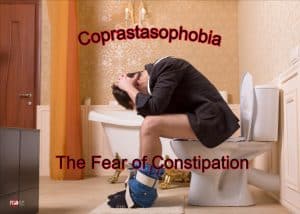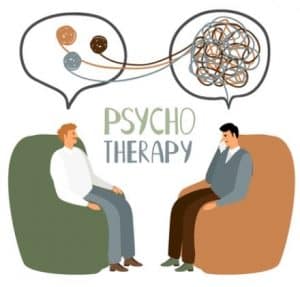Share This Article
Do you have a fear of pooping because of pain?
Do you worry about becoming constipated and go to extreme lengths to avoid it?
Do you feel yourself panicking at the mere thought of constipation?
If your answer to these questions is yes, then you are likely suffering from coprastasophobia, or the fear of constipation.
Being afraid of constipation may seem rational to you. After all, who wants the pain and stress that comes with being unable to poop when you need to?
The terror of sitting on the toilet unable to empty your bowels can be paralyzing—your heart pounds, your sweat glands work overtime, your limbs shake, and your entire lower body feels heavy. Constipation is stressful, so it’s no wonder you want to avoid it.
Living with a fear of constipation can take over your life. And if you fear your feelings are invalid, you may be hesitant to share your problem with anyone else, even your doctor.
But your fear is real, and your feelings are valid. You are also not beyond hope. It’s possible to overcome your fears if you can self-reflect and learn the cause of your phobia.

What Is Coprastasophobia?
Coprastasophobia is the fear of constipation. It originates from the term copro, which in Greek means feces, sta, the Latin word for fixed, and Phobos, the Greek god and personification of fear.
Those suffering from this condition experience a high level of anxiety merely thinking about being constipated. Such a fear, if left unattended, may result in depression or panic disorder as a consequence.
Coprastasophobics may go to extreme lengths to avoid constipation. Some may take laxatives multiple times a day, which can lead to other health problems.
Others may consume digestive supplements for a healthy gut, which in itself is not problematic. But the psychological stress of being unable to go a day or even a meal without taking such supplements can take its toll.
Those who fear constipation may go on a carefully designed prescription diet to eliminate any possibility of constipation. Of course, such a diet can lead to long-term health and wellness. However, obsessive food monitoring and entirely abstaining from certain ingredients because of a phobia may also result in health concerns.
What Causes the Fear of Constipation?
Phobias and irrational fears can stem from different causes, and the key to treating any health issue is understanding the root of it.
Coprastasophoia has no standard causes; nevertheless, genetics and one’s environment play decisive roles in the growth of this condition.
Family History
Try to think back on your life so far, all the way to your childhood. Did your parents warn you about the danger of constipation to get you to eat your fruits and veggies? Does anyone in your family suffer from coprastasophobia as well?
Someone with a family history of mental illness such as anxiety disorders or certain specific phobias may have a greater risk of developing the fear of constipation.
Trauma
Perhaps you’ve had your own bad experiences with constipation, and you’ve become fearful of ever going through it again. Or maybe a friend, family member, or colleague shared their constipation horror story, and you’ve never been able to forget it. Any emotionally painful event or trauma associated with constipation can lead to a phobia.
Digestive Issues
Another possible cause of coprastasophobia could be a history of irritable bowel syndrome. Digestive problems can lead to lethargy and pain. There can be long-term consequences of being constipated, such as colon problems. Someone suffering from stomach and bowel distress can become phobic about regularity.
Regardless of the source of your phobia, it’s something that can be difficult or even impossible to live with. It can take a toll on so many aspects of your life that you may wonder how you can get rid of this irrational fear.
What Are the Symptoms of Coprastasophobia?
Mental/Emotional Symptoms
All phobias lead to extreme behaviors to avoid the source of the trigger. Similarly, people with coprastasophobia go to extreme lengths to ensure that they never experience constipation.
These measures vary from person to person, but here are some common habits in coprastasophobics:
- Constant fear of digestive issues
- Eliminating certain foods from diet
- Extreme anxiety at the thought of constipation
- Feelings of dread during or after every meal
- Obsessive thoughts about digestion and constipation
- Mood swings and irritability
- Reliving previous or even fictional experiences of constipation
- Sticking to the same ingredients daily
- Taking heavy medicines or supplements
- Withdrawing from relationships
Physical Symptoms
Of all the symptoms of coprastasophobia, the most prevalent is anxiety. Extreme anxiety can lead to panic attacks. Anxiety and panic attacks manifest in different ways, but here are some of the most common physical symptoms:
- Chest pain
- Choking sensation
- Difficulty breathing
- Disorientation or confusion
- Dizziness
- Dry mouth
- Heart palpitations or rapid heartbeat
- Hot flush
- Nausea
- Numbness
- Ringing ears
- Shaking
- Sweating
Dealing with Coprastasophobia
Since there are no absolute causes of coprastasophobia, no one treatment is perfectly effective for this condition.
However, this doesn’t mean it’s untreatable. If your paralyzing fear of constipation is keeping you from experiencing all that life has to offer, several forms of treatment can significantly dial down most of the symptoms of coprastasophobia.
Self-Help Options for Coprastasophobia
Exercise
The American Psychology Association says that exercise helps the mind deal more effectively with stressful situations. Furthermore, exercise is beneficial for those suffering from anxiety disorders like coprastasophobia. Cardiovascular exercise, weight-resistance training, and aerobic exercise can help relieve the consequent stress.
Relaxation Techniques
Yoga, meditation, mindfulness, and other similar relaxation techniques can help control breathing and alleviate stress. When you concentrate on your body in the present and let go of fears and other negative feelings, you can begin to develop a more rational and calm response to your fears.

Professional Help for Coprastasophobia
Some widely used treatments for phobias include:
Exposure Therapy
Exposure therapy is the most widely administered treatment for people suffering from various phobias. In the case of coprastasophobia, you may be exposed to the natural processes that occur in the body during constipation while simultaneously educating you on the issue.
Education is crucial for those with coprastasophobia. Greater exposure to the source of fear (the complexity of the digestive system) makes the fear less potent over time.
Cognitive Behavioral Therapy (CBT)
CBT is another form of treatment used to help those with a generalized anxiety disorder (GAD), obsessive-compulsive disorder (OCD), and other similar conditions.
Through CBT, those with coprastasophobia may come to understand why they think the way they do. Understanding the fundamentals of your reflexes may help you take a more sensible approach to this fear.
Coping with Coprastasophobia
The best way to overcome any difficulty is to take good care of yourself. Knowing how to help yourself is vital to controlling your fear of constipation and avoiding a severe physical or mental/emotional response.
It’s also important to acknowledge the existence of your fear and seek support to help you deal with it. Compassionate family members and friends can help with anxiety symptoms, and working with a professional can help you find the root cause of your fear and deal with it effectively.
Final Thoughts
Managing your fear of constipation is not an overnight process. But it’s important to seek help managing your anxiety, so you can go back to normal life. Soon enough, you’ll be able to eat anything you want without fear of what happens next.



